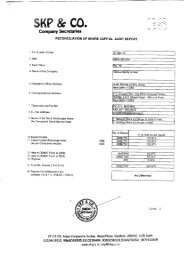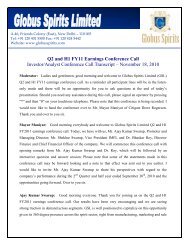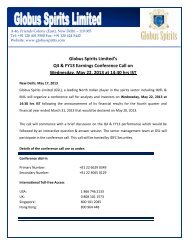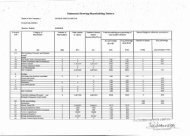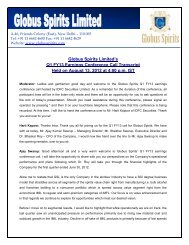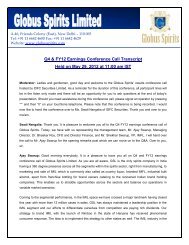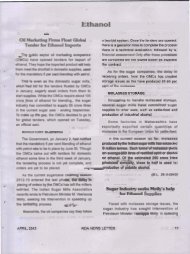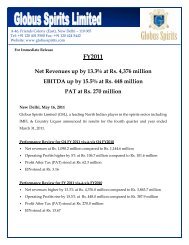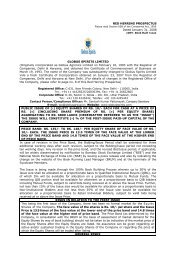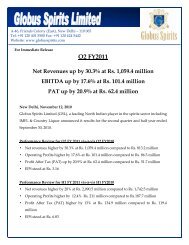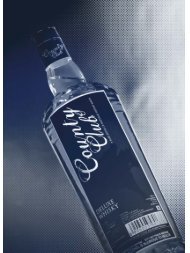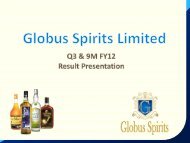RED HERRING PROSPECTUS Dated August 24 ... - Globus Spirits
RED HERRING PROSPECTUS Dated August 24 ... - Globus Spirits
RED HERRING PROSPECTUS Dated August 24 ... - Globus Spirits
You also want an ePaper? Increase the reach of your titles
YUMPU automatically turns print PDFs into web optimized ePapers that Google loves.
Sr.<br />
No<br />
Mark<br />
Registration<br />
Number<br />
Class Goods Covered Renewal Due Date<br />
1 John Mc Lane 114532 33 Whisky, Rum, Brandy, Gin, Vodka,<br />
wine & other alcoholic beverages<br />
included in class 33<br />
2 White Lace 114533 33 Whisky, Rum, Brandy, Gin, Vodka,<br />
wine & other alcoholic beverages<br />
included in class 33<br />
3 Samurai (Logo) 114534 33 Whisky, Rum, Brandy, Gin, Vodka,<br />
wine & other alcoholic beverages<br />
included in class 33<br />
4 Hannibal 114535 33 Whisky, Rum, Brandy, Gin, Vodka,<br />
wine & other alcoholic beverages<br />
included in class 33<br />
5 <strong>Globus</strong> <strong>Spirits</strong><br />
Logo<br />
114556 33 Whisky, Rum, Brandy, Gin, Vodka,<br />
wine & other alcoholic beverages<br />
included in class 33<br />
6 20-20 117531 33 Whisky, Rum, Brandy, Gin, Vodka,<br />
wine & other alcoholic beverages<br />
included in class 33<br />
January 22, 2023<br />
January 22, 2023<br />
January 22, 2023<br />
January 22, 2023<br />
January 22, 2023<br />
July, 22, 2023<br />
There are no trademarks, other than mentioned above, and services marks, which have been<br />
applied for or registered or used by the Company. No patents or utility models have been applied<br />
for or granted to or used by the Company. There are no employee inventions or any compulsory<br />
licenses, which may be or have been granted in respect thereof. There are no material inventions<br />
used by the Company in respect of which patents have not yet been applied for or granted. There<br />
are no registered designs applied for or used by the Company. Due to the peculiar business of the<br />
Company (i.e., producing alcohol products), there are no internal documents setting out the<br />
policies and procedures followed by the Company in relation to intellectual property rights. There<br />
are no actual or threatened litigation or opposition proceedings relating to any intellectual property<br />
rights used by the Company.<br />
INDUSTRY REGULATIONS<br />
The movement of IMFL products is regulated across states. The entire process of manufacturing<br />
to distribution and sales attracts taxes a plenty.<br />
In India, alcohol is a state subject meaning that all tax and regulatory issues in the industry are<br />
controlled and regulated by the individual state governments and not by the central government.<br />
Alcoholic beverages are among the most highly taxed and highly regulated industries in India.<br />
The liquor industry is suffering from over taxation and over regulation, which has impeded the<br />
profitability even in the face of continuing growth in demand for liquor products. State<br />
governments have in the past capitalized on the price-inelastic characteristic of liquor<br />
consumption by imposing new and higher taxes on manufacture and sale of liquor in their<br />
respective jurisdictions. The net result is a complex and restrictive duty structure that varies<br />
from one state to another. State governments have typically levied a varieties of taxes on<br />
alcohol products including excise duty, sales tax, license fee, state-level import and export duty,<br />
bottling fee, welfare levy, assessment fee, franchise fee, turnover tax, surcharge etc.<br />
Regulatory changes have imposed a further burden in the industry by an amendment of section<br />
206 C of the Income tax Act. The Government of India imposed a mandatory Income Tax of 1%<br />
to be collected at source on sales. This has had an impact of increasing the price of liquor<br />
products at the hands of the consumer.<br />
The Indian potable alcohol market has high entry barriers, largely due to government<br />
regulations. The policies and levies on alcohol vary from State to State. In most of the States,<br />
the distribution of alcohol is regulated by the concerned State Government.<br />
119



